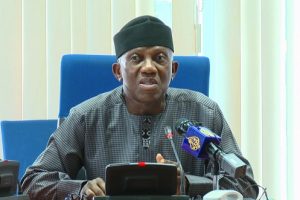BY ADDISALEM MULAT
With tripartite talks facing a rocky road, Ethiopia has been making efforts to break the stalemate on the Grand Ethiopian Renaissance Dam (GERD). It has been quite a while since Ethiopia, Sudan and Egypt entered at loggerhead.
Ethiopia’s genuine endeavor could not attain the envisioned target due to the smear campaigns of Egypt and Sudan getting the talks out of tracks. Particularly, Egypt has been leaving no stone unturned to twist Ethiopia’s arm in the talks by utilizing a wide variety of techniques.
As Cairo does not have the interest to resolve the Nile issue in a peaceful manner with Ethiopia, for years, Egypt unwisely tried to internationalize and politicize a purely technical matter that could have been resolved without the involvement of a third party.
Egypt first took the case straight to the United States of America. However, the latter in a broad daylight ended up taking sides with Egypt while prompting Ethiopia’s withdrawal from the talks. This approach could not shed light on peace given that the truth always wins. Again, Cairo in another foiled attempt had taken the issue to UNSC to make it an international security issue. The conspiracies of Egypt have unfortunately continued to date though the matter is placed on African Union mediation.
Dismayed by its self-inflicted harm, Egypt is trying to brew another conspiracy which is to divide upstream countries and sway mediators to its position.
It is now rumored that in the present circumstances Egypt is rubbing shoulders with the newly elected African Union Chairperson of the Democratic Republic of Congo, President Felix Tshisekedi targeting at materializing its dream. There is a growing fear that Egypt will leave no stone unturned to twist the arms of the president.
Today, the bilateral ties between Egypt and Congo are viewed as among the strong relations in Africa mostly driven by Cairo’s far-fetched objectives. The factors include Egypt’s diplomatic failure to politicize and internationalize the GERD talks, Congo’s chairmanship of the African Union and Congo’s increasing economic dependence on Egypt.
Egypt’s’ foreign policy towards the Nile upstream countries is divisive and full of conspiracies. It has been trying to forge strong tie especially the Democratic Republic of Congo, which has been one of Egypt’s political and strategic allies since the beginning of the Nile water dispute.
As Egypt is trying to put maximum pressure against Ethiopia for not building the GERD, it is also extending maximum support to Congo to utilize its water resources through the provision of finance and technical support. The Egyptian grants that were agreed accounts 10 million USD and were allocated for the execution of six projects, including the design studies and commissioning of the Inga Dam.
Egypt is trying to expand its diplomatic presence among upstream countries to undo the milestone progress made among the Nile riparian countries over the years. And, it sees Congo as the agent. Over the last three years, there have been over 20 high-level exchanges between the two countries.
With this approach, Cairo seeks to sow discord among upstream Nile countries. In a divisive speech “[The Democratic Republic of Congo] has been consistently supporting the Egyptian stance and opinion and refused to sign the Entebbe Agreement — unlike Burundi, which signed it after the Egyptian revolution in 2011.
[The Democratic Republic of Congo’s] position to support Egypt in the dispute
between it and the Nile upstream countries on water management in the Nile basin is clear and explicit. In this regard, a Congolese official said in 2016: “We will not sign any agreements that harm Egyptian interests,” referring to the Agreement on the Nile Basin Cooperative Framework, also known as the Entebbe Agreement.
As learnt from AL Arabiya News, Egypt and Sudan proposed the current African chair Democratic Republic of Congo should lead the endeavor to resume discussions over the Nile River. The move comes into being after DR Congo President Felix Tshisekedi embarked on his one-year term as AU chair substituting the South African President Cyril Ramaphosa, vowing to seek “ innovative solutions” to resolve the dispute.
During the visit to Egypt, the two nations’ leaders come to terms about championing orchestration and mutual deliberations to follow up on the developments in the GERD Record. The president as well vowed to resolve the dispute that has been taking place between Ethiopia, Sudan, and Egypt.
According to the Ministry of Foreign Affairs of Ethiopia, members of the Presidential Panel formed by the President of the DRC on the tripartite negotiations on the Grand Ethiopian Renaissance Dam had visited Ethiopia from March 03 to 07, 2021. During the meeting, the delegation held talks with the President of the Federal Democratic Republic of Ethiopia, the Deputy Prime Minister and Minister of Foreign Affairs, the Minister of Water, Irrigation and Energy, and representatives of negotiating countries.
Regarding the issue, in an interview Mohammed Al-Arusi, a man who is known for conducting more than ninety televised debates in relation to Ethiopia gave to The Ethiopian Herald said, “Egypt is calling for international mediation instead of AU-led negotiations in furtherance of achieving something valuable from international mediation. To be honest, there will not be anything Egypt will secure out of the international mediation.
As African solutions are required to African problems, other nations have no say on the African issue. As the issue is an African matter, the AU must get to the bottom of the problem in its way.
He went on to say, “No matter how hard Egyptians try, they cannot make their dream become a reality given that truth always wins. Ethiopia would like to utilize its resources in the interest of providing its people with electricity and pulling them out of poverty. As Ethiopia believes in fair and equitable distribution of the Nile, it does not want to harm downstream countries.
He elucidated that the conundrum behind the debacle to reach an agreement of equitable use of Nile water is Egypt’s rigidity to historic right and colonial period treaties in the shadow of all the Nile River Initiative nations encompassing Ethiopia, a country that produces 86% of the Nile water.
“According to my way of thinking, this kind of act will move the existing situation into uncharted territory. The only way out is, making every effort to solve the problem through dialogue and other peaceful means,” he continued.
“As sovereign nations, Egypt and the Democratic Republic of Congo can establish relations as they wish. But in doing so, the former cannot materialize their dreams and make an impact on Ethiopia seeing that the truth is always with Ethiopia.” he wrapped up.
In an interview Dr. Eng. Tilahun Erduno gave to The Ethiopian Herald said, “The construction of the Grand Ethiopian Renaissance Dam has been the source of disputes. The Nile issue has been escalating and de-escalating since time immemorial and turning out to be the talking points of the entire world. Even though Ethiopia made an effort to get to the problem through dialogue, the intended target has not been achieved yet on the basis of the negligence of Egypt,”
Egypt strongly accepts as true that the Nile issue cannot be addressed peacefully. On several occasions, the Egyptian officials come up with the Herodotus saying, “Egypt is the gift of the Nile” and the colonial-era treaties. The adage should not be brought into play now and then to ostracize Ethiopia from employing its resource within its sovereignty territory. Furthermore, they do not endeavor to resolve the problem by relying on other nations’ efforts illegally. They do not want to face the truth and take the bull by the horns.
He stressed that despite Ethiopia’s believes in inequitable and reasonable utilization of water, and opens room for discussion several times, they get off the subject time and time again. As to me, it is to respect and credit African Ethiopia more than Asian Arabs on the grounds that it gives life to Egypt. Likewise, Egypt has been doing the whole lot possible to debilitate, destabilize and fracture Ethiopia and keep its domination on the Nile River.
“When Ethiopia embarked on constructing the Grand Ethiopian Renaissance Dam to fulfill the demands of 60% of its population for electric power with no significant harm to riparian nations, Egypt and Sudan jump-started getting out of the line and busying themselves with other conspiracies.” he concluded
The Ethiopian Herald 21 March 2021



